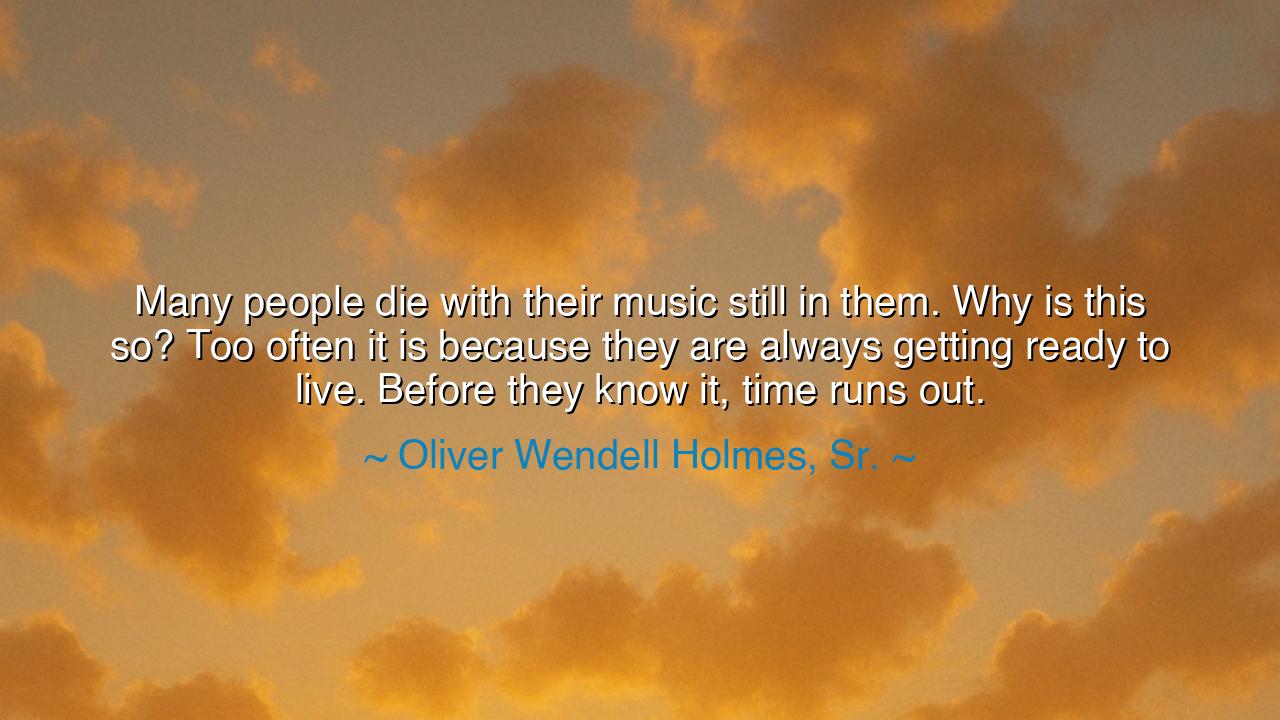
Many people die with their music still in them. Why is this so?
Many people die with their music still in them. Why is this so? Too often it is because they are always getting ready to live. Before they know it, time runs out.






Hear the solemn wisdom of Oliver Wendell Holmes, Sr., who warned with words that echo across the ages: “Many people die with their music still in them. Why is this so? Too often it is because they are always getting ready to live. Before they know it, time runs out.” In this saying lies the tragedy of wasted potential, of dreams deferred until they wither in silence. For each soul is born carrying a music within—its gifts, its passions, its unique song to share with the world. Yet too often that song is never sung, for fear, delay, or endless preparation steal away the chance to truly live.
To speak of music here is to speak not only of melody, but of purpose. Every person carries within them a harmony meant to be expressed—a craft, a love, a calling, a vision. But Holmes saw in his time, as we see still in ours, how many wait endlessly for the perfect hour. They say, “When I am ready, then I will begin.” Yet readiness never comes, and life slips silently away. The silence of their song becomes the silence of the grave.
The ancients knew this peril well. Seneca, the Stoic, wrote that while life is long enough if lived fully, most men waste it in hesitation. They are always preparing, never beginning. They guard their dreams as though tomorrow is promised, forgetting that time is a thief with no warning. Holmes, like Seneca before him, reminds us that the greatest enemy of living is not failure but delay. The one who waits endlessly is defeated long before the battle begins.
Consider the life of Vincent van Gogh. Poor, ridiculed, and dismissed in his lifetime, he nevertheless poured his music onto the canvas day after day. Though unrecognized, though often despairing, he did not silence the song within him. He died young, but he died having expressed his gift, and his art now resounds across the world. Compare this to the countless nameless ones, equally gifted, who hid their talents, always waiting for a safer, easier time to live. Their silence is their legacy, while Van Gogh’s music endures forever.
Holmes’ words strike like a clarion: to live is not to prepare endlessly, but to act. The perfect time will never come, and the risk of failure is the price of authenticity. Better to sing an imperfect song than to leave the world in silence. The coward seeks refuge in preparation; the courageous step forward, trembling but true, knowing that tomorrow is not guaranteed.
Therefore, beloved seeker, take this wisdom into your heart: do not die with your music unplayed. Do not carry your gifts to the grave, unopened, unseen. Speak the words you have longed to speak, create the work you have feared to attempt, love the ones you have delayed in loving. Begin now, even in small steps, for to begin is already to live.
Practical action is clear: write the first page, sing the first note, take the first step, however small it may be. Replace hesitation with practice, fear with persistence. Each day, ask yourself: “Am I living, or merely preparing to live?” Let that question stir you into action, lest time, silent and merciless, steal from you the chance to sing your song.
And so, remember the wisdom of Holmes: time runs out, but the music within you is eternal—if you dare to release it. Let not your song be buried in silence, but let it rise like a flame into the world, so that when your final hour comes, you may leave not in silence, but in triumph, with your music echoing in the hearts of generations to come.






AAdministratorAdministrator
Welcome, honored guests. Please leave a comment, we will respond soon